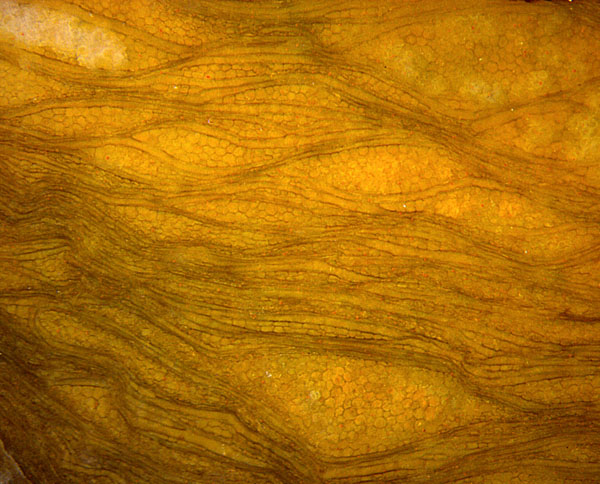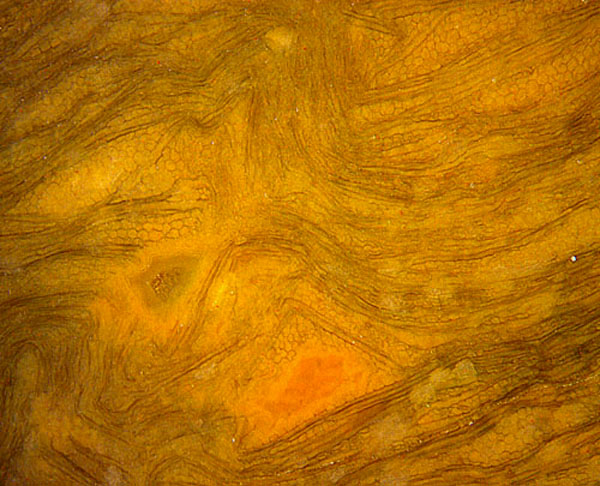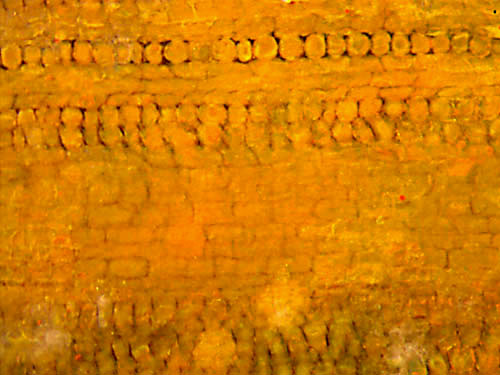Permian wood with wide pith rays
 One
small sample of Permian wood
with large pith rays found in the Doehlen basin is in peculiar ways
related to the discovery
of the worldwide biggest Permian calamite in Chemnitz [1]. The complex
and sad story of its discovery has been told before.
One
small sample of Permian wood
with large pith rays found in the Doehlen basin is in peculiar ways
related to the discovery
of the worldwide biggest Permian calamite in Chemnitz [1]. The complex
and sad story of its discovery has been told before.
This contribution provides complementary
information supporting the assumption that this wood not only led the
way to the
discovery but
possibly
also represents the
biggest
calamite or a close relative of it.
Fig.1: Tangential section of silicified wood with
cross-sections of exceptionally wide pith rays. Image width 4mm.
The wide pith rays of various size and
distribution imply
irregular curvature of the "normally" straight wood tracheids. This
uncommon type of wood structure is seen throughout the sample, with the
exception of small areas where the wood had been deformed and crushed
but not cracked before silicification.
Fig.2: Same as Fig.1 but locally deformed before
silicification. Image width 4mm.

Local damage to the wood tissue involves loss of
coherence and kink formation of the tracheids, as
seen in Fig.2. Beside
the chaotic mess of deformed tracheids, the cross-sections of the large
pith rays are clearly visible.

Fig.3: Cross-section of silicified wood with wide pith rays: radial
files of wood tracheid cross-sections and brick-like pith cells. Image
width 1.7mm.
The wood tracheids are obviously not quite aligned along the
stem direction, which is horizontal in Fig.1. These mostly small
deviations do not appear in the
cross-section of the wooden stem as seen in Fig.3, which shows a cut
plane perpendicular to the picture plane of Fig.1.
Wood with wide pith
rays, as known from calamites and from Pitus primaeva [2],
differs markedly from conifer wood.
Sample: found in 2000 at the
type locality of Scolecopteris
between Kleinnaundorf and Burgk, kept in the own collection under the
label Bu7/20.1.
H.-J.
Weiss 2022
[1] R.
Rössler, R. Noll:
Sphenopsids of the Permian I: The largest
known anatomically preserved calamite, ...
Rev.
Palaeobot. Palyn. 140(2006), 145-62.
[2] J.
Galtier:
Pitus, a
giant tree from Early Carboniferous. in: U. Dernbach, W.D. Tidwell:
Secrets of Petrified Plants, D'ORO 2002, 34-37.
|

|
 43 43 |

 43
43 One
small sample of Permian wood
with large pith rays found in the Doehlen basin is in peculiar ways
related to the discovery
of the worldwide biggest Permian calamite in Chemnitz [1]. The complex
and sad story of its discovery has been told before.
One
small sample of Permian wood
with large pith rays found in the Doehlen basin is in peculiar ways
related to the discovery
of the worldwide biggest Permian calamite in Chemnitz [1]. The complex
and sad story of its discovery has been told before.


 43
43